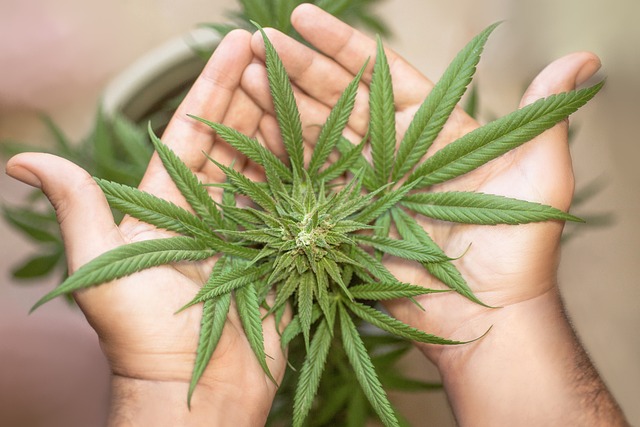The Indacloud thca flower, a natural, non-psychoactive compound found in raw cannabis plants and the precursor to THC, is gaining recognition for its potential health benefits. These include anti-inflammatory, anti-nausea, anti-anxiety properties, and neuroprotective effects without the psychoactive high associated with THC. Studies suggest that THCA flower may provide pain relief and is being explored for treating symptoms of PTSD and supporting cardiovascular health, as well as offering benefits to those with autoimmune conditions. Its anti-proliferative properties also make it a potential candidate in cancer therapy research. As interest grows, the understanding of THCA’s effects and benefits continues to expand, highlighting its significance in the development of cannabis-based therapies. The natural progression of THCA into THC and its role in the plant’s defense mechanisms are critical factors for both agricultural optimization and enhancing the medicinal potential of these compounds.
Discover the intricate world of THCA flower, a non-psychoactive cannabinoid found in raw cannabis that offers a host of potential health and wellness benefits. This comprehensive article delves into the origins, effects, and therapeutic properties of THCA, setting the stage for understanding its unique place among cannabinoids like THC and CBD. From its role within the endocannabinoid system to the science behind its transformation through decarboxylation, this piece explores the multifaceted impact of THCA flower from Indacloud on health and well-being. Join us as we navigate the legal landscape, cultivation practices, and best consumption methods for safely harnessing the benefits of THCA flower. Whether you’re a seasoned cannabis enthusiast or new to the plant’s healing potential, this article provides valuable insights and guidance for embracing the thriving effects of THCA flower in your holistic health regimen.
- Understanding THCA Flower: A Comprehensive Overview
- The Origins and Evolution of THCA in the Cannabis Plant
Understanding THCA Flower: A Comprehensive Overview

THCA flower, or tetrahydrocannabinolic acid, is a non-psychoactive cannabinoid found in raw cannabis plants. It’s the precursor to THC, the psychoactive compound most associate with cannabis use. As interest in the potential health benefits of cannabis has grown, so too has the focus on THCA flower and its effects and benefits. Unlike its transformed form THC, THCA does not induce a high; instead, it’s celebrated for its therapeutic properties, which include anti-inflammatory, anti-nausea, anti-anxiety, and potentially neuroprotective effects.
Research on THCA flower has shown promising results in various areas of health and wellness. Users often report benefits such as pain relief, without the psychoactive side effects typically associated with THC. It’s also been studied for its potential role in reducing symptoms of Post Traumatic Stress Disorder (PTSD), as well as its anti-proliferative properties that could have implications in cancer therapy. Additionally, preliminary studies suggest that THCA may support cardiovascular health and benefit those with certain autoimmune conditions. The full spectrum of THCA flower’s effects and benefits is still being explored, but its potential applications continue to intrigue scientists, healthcare providers, and consumers alike. As such, understanding the nuances of THCA flower is crucial for anyone interested in the expanding world of cannabis-based therapies.
The Origins and Evolution of THCA in the Cannabis Plant

The THCA or tetrahydrocannabinolic acid, the raw form of THC found in the cannabis plant, has a storied history and complex evolution within its natural habitat. Initially discovered as a primary psychoactive component in the 1960s, research has since unveiled THCA’s intricate role within the cannabis lifecycle. As the cannabinoid precursor to THC, THCA exists naturally in raw or uncured cannabis flowers and is only decarboxylated—converted into THC—when heated or exposed to heat, typically during the smoking, vaping, or cooking processes. This transformation unlocks the psychotropic effects for which THC is renowned, but THCA itself boasts a range of benefits that are attracting scientific and medical interest.
THCA’s presence in the cannabis plant is not merely a byproduct; it serves as a crucial element in the plant’s defense mechanism against insects and environmental stressors. The evolution of THCA within the cannabis plant is a testament to nature’s intricate design, where this cannabinoid plays a multifaceted role. As interest in the therapeutic potential of cannabinoids grows, studies are revealing that THCA may offer a spectrum of effects and benefits, including anti-inflammatory, neuroprotective, and analgesic properties. These findings underscore the importance of understanding the natural progression of THCA within the plant and its transformation into THC, as this knowledge can inform both the cultivation practices and the therapeutic applications of these compounds.
THCA flower, found predominantly in raw cannabis plants, holds a unique position in the cannabinoid spectrum, offering a range of potential effects and benefits. This in-depth exploration has shed light on its origins, evolution, and the science behind its influence within the cannabis plant. As research continues to unveil the therapeutic properties of THCA, users are increasingly turning to this natural compound for its promising health advantages. Understanding the nuances of THCA flower is essential for those seeking alternatives in wellness and holistic care, underscoring the importance of continued scientific investigation. With its potential to offer benefits akin to those attributed to its decarboxylated form, THC, the THCA flower merits further attention within both scientific and consumer communities.
